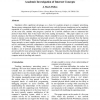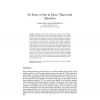81 search results - page 2 / 17 » Do Students Who See More Concepts in an ITS Learn More |
CN
2000
13 years 5 months ago
2000
Simulation offers significant advantages as a basis for academic projects in computer networking. many unimportant details can be abstracted away, and also because simulations can...
UM
2005
Springer
13 years 10 months ago
2005
Springer
This paper presents an evaluation study that measures the effect of modifying feedback generality in an Intelligent Tutoring System (ITS) based on Student Models. A taxonomy of the...
ITS
2010
Springer
13 years 9 months ago
2010
Springer
Pedagogical tutorial tactics are policies for a tutor to decide the next action when there are multiple actions available. When the contents were controlled so as to be the same, l...
AIED
2009
Springer
13 years 11 months ago
2009
Springer
Intelligent tutoring systems often rely on interactive tutored problem solving to help students learn math, which requires students to work through problems step-by-step while the ...
AIEDU
2005
13 years 5 months ago
2005
The Bayesian framework offers a number of techniques for inferring an individual's knowledge state from evidence of mastery of concepts or skills. A typical application where ...


